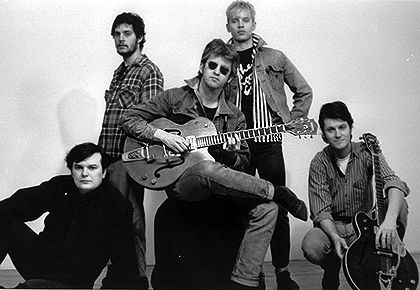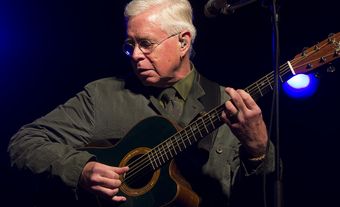James Gregory Keelor (né Francis McIntyre), OC, singer, songwriter, guitarist, producer (born 29 August 1954 in Inverness, NS). Greg Keelor is best known as a principal songwriter, lead singer and guitarist in the iconic country-rock band Blue Rodeo, along with co-founder Jim Cuddy. He has also written and performed his own solo work, and produced the work of other musicians. As a member of Blue Rodeo, Keelor has won dozens of awards, including a Governor General’s Performing Arts Award, and has been inducted into Canada’s Walk of Fame and the Canadian Music Hall of Fame.
Education and Early Career
Born Francis McIntyre in Inverness, Cape Breton Island (Nova Scotia), in 1954, Keelor was adopted at age three and raised in Montréal. He later attended North Toronto Collegiate Institute, where he became friends with football teammate Jim Cuddy in 1971. After graduation, they took a trip to Western Canada in a converted school bus with high school friends. After the bus broke down in Saskatchewan, Keelor learned to play guitar while working in Lake Louise. Long interested in the Canadian wilderness, he applied but did not gain entrance into the University of Guelph’s forest management program.
In 1978, Keelor and Cuddy, with Jim Sublett and Malcolm Schell, started the Hi-Fis, a Toronto-based power-pop punk band. After the band folded in 1981, Keelor and Cuddy moved to New York City and formed the band Fly to France (1981–84), which produced a demo tape consisting of later Blue Rodeo songs “Try,” “Outskirts,” “Rose-Coloured Glasses” and “Floating.”
Blue Rodeo

Unable to generate label interest in their demo, Keelor and Cuddy returned to Toronto and formed Blue Rodeo in 1984, along with bassist Bazil Donovan, drummer Cleave Anderson and keyboard player Bobby Wiseman. Keelor and Cuddy shared songwriting and lead vocalist duties, with Keelor’s gravelly voice and esoteric lyrics contrasting Cuddy’s smooth, ballad-ready pop vocals. With a wide-ranging sound encompassing folk, pop, rock and country, Blue Rodeo became one of the most successful and beloved Canadian bands of all time, releasing more than a dozen studio albums, winning nearly a dozen Juno Awards and selling more than four million albums. Known for their energetic and warm live performances, Blue Rodeo continues to tour, connecting with loyal audiences across the country.
Solo Work
Keelor has released three solo albums: Gone (1997), Seven Songs for Jim (2005) and Aphrodite Rose (2006). Gone, whichfeatured Sarah McLachlan on vocals and piano,was inspired by a pivotal period in the mid-1990s when Keelor developed diabetes, suffered serious injuries after falling off of a ladder, found out that he was adopted, met his birth mother, and spent time with a guru in India.
Seven Songs for Jim was dedicated to Keelor’s adoptive father, who died in 2003. Keelor produced, wrote and played nearly all instruments on the album, which earned critical praise for its soulful and sorrowful mood. His happier, pop-inspired Aphrodite Rose featured The Sadies and backing vocals from McLachlan. Keelor also scored the original soundtrack for the Canadian Western comedy film Gunless,starring Paul Gross, which was released as the Gunless Original Soundtrack (2010).
Collaborative Work
Outside of Blue Rodeo, Keelor has collaborated with many musicians and artists. In 1988, he formed the folk-rock band Crash Vegas with singer-songwriter Michelle McAdorey. Bassist Jocelyne Lanois, sister of Daniel Lanois, and drummer Ambrose Pottie joined the band soon after. In 1989, guitarist Colin Cripps replaced Keelor in the band, as Keelor’s commitments with Blue Rodeo grew. Although Keelor left Crash Vegas before the release of their first album, Red Earth (1989), he co-wrote several of the songs, and played guitar on the tracks “Red Earth” and “The One that Keeps Me Running.”
In 2004, Keelor formed the indie roots-rock band The Unintended with Mike Belitsky, Sean Dean, Dallas Good and Travis Good of The Sadies, and Rick White of Eric’s Trip and Elevator. The band released two albums: The Unintended (2004) and a split album with the Constantines, Constantines Play Young/Unintended Play Lightfoot (2006).
Keelor also worked with Travis Good to set to music the poetry of actor and writer Gordon Pinsent. The resulting two-disc album Down and Out in Upalong (2010) featured Pinsent’s lyrics set to bluegrass and acoustic rock music. The melancholy album was critically praised for its quintessential Canadian content.
Keelor has also appeared as a backing musician for many notable Canadian musicians and bands, including Melissa McClelland, The Sadies, Ben Rose, Great Big Sea, Carolyn Mark, Cuff the Duke, Sarah McLachlan and Justin Rutledge.
Hearing Loss
In 2010, Keelor began showing signs of tinnitus, a condition of noise-induced hearing loss and persistent ringing in the ears that has affected many rock musicians, including Neil Young, Brian Wilson and Eric Clapton. As a result, Keelor relegated himself to playing only acoustic guitar and the band recruited Colin Cripps to handle all of Keelor’s electric guitar parts. Keelor has said that this quieter sound resulted in more grounded albums and performances.
Production
Keelor co-produced Blue Rodeo’s album Lost Together (1992), as well as Cuff the Duke’s albums Way Down Here (2009) and Morning Comes (2011). Those two albums, along with Blue Rodeo’s Five Days in July (1993), Nowhere to Here (1995) and In Our Nature (2013), were recorded at Keelor’s Lost Cause Studios, located on a farm in Kendal, Ontario.
Activism
Interested in environmental and human rights issues, Keelor organized the compilation album Pine Ridge: An Open Letter to Allan Rock/Songs for Leonard Peltier (1996) to help raise awareness and support for Leonard Peltier, an Aboriginal activist who was convicted in the United States for the 1975 murder of two FBI agents in South Dakota. Notable Canadian artists appearing on the album include Sarah McLachlan, Jane Siberry, Michael Ondaatje, The Skydiggers, The Tragically Hip and Ashley MacIsaac. Keelor also publicly supported the Idle No More movement, often using live performances of the Blue Rodeo song “Fools Like You” to criticize the manner in which the federal government’s Bill C-45 (2012) addressed First Nations’ treaty rights.
Honours and Awards
As of 2014, Keelor had won 11 Juno Awards as a member of Blue Rodeo (including five for Group of the Year), 15 SOCAN Classics Awards for songs that had been played at least 100,000 times on Canadian radio, and SOCAN’s National Achievement Award. He also received a star on Canada’s Walk of Fame in 2009, was inducted into the Canadian Music Hall of Fame in 2012, and was awarded a Governor General’s Performing Arts Award for Lifetime Achievement in 2014. In 2013, Keelor and Cuddy were each named Officers of the Order of Canada, and a new street in Toronto was named Blue Rodeo Drive in the band’s honour.
For more awards see: Blue Rodeo

 Share on Facebook
Share on Facebook Share on X
Share on X Share by Email
Share by Email Share on Google Classroom
Share on Google Classroom

